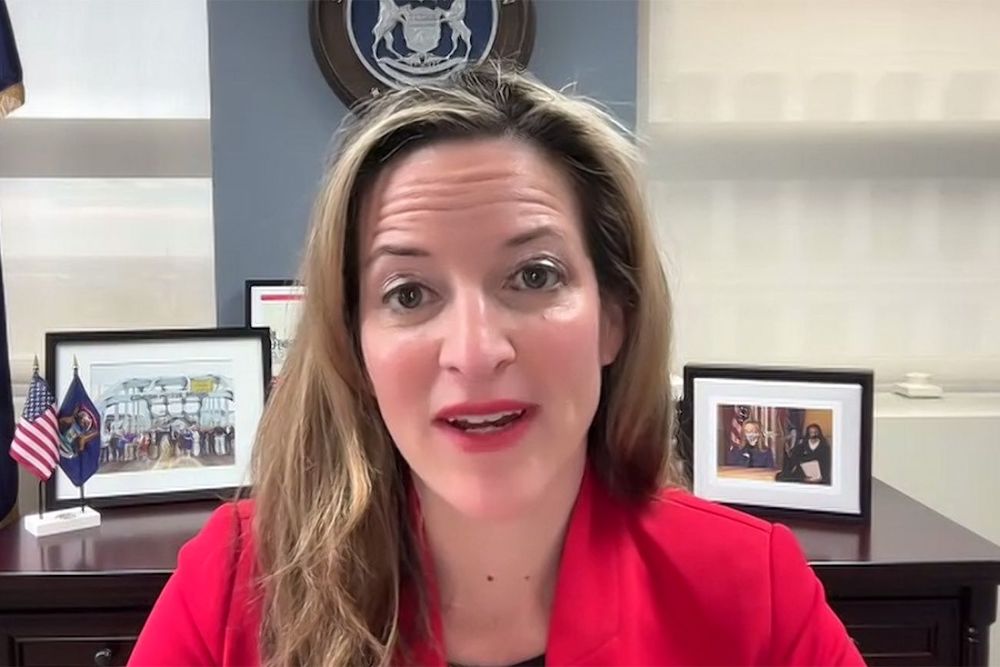Michigan rolls out ‘interim’ Proposal 1 financial disclosure portal

Secretary of State Jocelyn Benson unveiled the reporting portal currently serving public officials will need to use by April 15 to disclose their personal finances. Bridge photo by Jordyn Hermani.
by Jordyn Hermani (Bridge Michigan)
LANSING — Politicians will file their first personal financial disclosures next month and the reporting system to do so is now up and running, Secretary of State Jocelyn Benson announced this week.
The state will be offering training sessions “in the coming days,” to walk candidates through the new filing system, Benson said Thursday.
That new site – referred to as the Michigan Transparency Network, or MITN – builds off both a constitutional amendment passed in 2022, as well as a four-bill package signed into law in 2023. Because of both efforts Michigan is no longer one of two states, the other being Idaho, to not require top elected officials to publicly disclose their personal finances.
“The purpose of this system, of course, is to ensure that the personal financial disclosure requirements of Proposal 1 are met appropriately,” Benson said, “and that the people of Michigan are able to have access to this important information.”
The system, unveiled Thursday, is “considered an interim solution” which meets “all of the legal and all of the data requirements,” said Bob Burns, director of the Filing, Compliance and Disclosure Division of the Michigan Department of State.
A more robust and consolidated system will go online sometime between late 2024 and January 2025, “that will handle this personal financial disclosure, campaign finance, lobbying and legal defense fund reporting all in one,” he added.
“What you’ll see going forward with our permanent system, one, it’ll be integrated with all of our disclosure systems for the state of Michigan,” Burns said, “but it’ll also have a little bit more robust search tools for the general public, as well as easier use for filers.”
Proposal 1, approved by more than two-thirds of voters in 2022, was two pronged: One part altered legislative term limits, while another required greater financial disclosure for public officials and those running for elected office.
Under the disclosure portion, the governor, lieutenant governor, secretary of state, attorney general and members of the legislature are required to file annual public financial disclosure reports by April 15. Candidates for office will have to file by May 15. Reports must include financial information on the person’s spouse.
These reports would list an individual's assets, liabilities, income sources, future employment agreements, gifts, travel reimbursements and positions held in organizations other than religious, social or politically affiliated groups.
Burns said filers would also have the ability to leave “optional reporting information,” in addition to what’s already legally required.
Asked about that extra reporting option, Benson said it was to avoid the possibility of things being “taken out of context.” She gave the example of a candidate listing stocks or investments they had with Ford Motor Company.
“If it’s two stocks versus 2,000, it makes a difference,” Benson said. “We wanted to give people the opportunity … to provide additional context if they choose to, to avoid any sort of misrepresentation or misunderstanding of what they were disclosing.”
Michigan’s Legislature was tasked with implementing Proposal 1 prior to the end of 2023, though that process was mired in concern that legislative efforts provided too many loopholes and weren't harsh enough with penalties.
Failing to file a report could land a candidate an up to $1,000 fine, while explicitly lying on a report could result in a fine of up to $2,000. By contrast, in Congress, those fees could be as high as $50,000.
Before it landed on Gov. Gretchen Whitmer’s desk, a handful of lawmakers slammed the package for not going far enough with disclosure requirements, among other things, during its final Senate vote.
Sen. Jim Runestad, R-White Lake, likened the final policy to "nothing more than a hoax, a smoke and mirrors attempt to delude the voters” during a November 2023 floor speech.










You must be logged in to post a comment Login